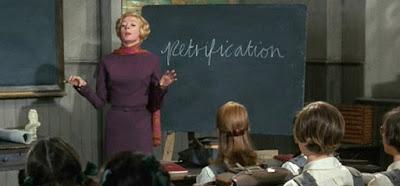Format: DVD from NetFlix on laptop.

I knew very little about The Prime of Miss Jean Brodie going in except that it starred the great Maggie Smith and that she won an Oscar for her performance. I’m predisposed to like Maggie Smith. Like many people, my knowledge of her modern work pretty much starts and ends with the Harry Potter movies, but seeing her work from half a century ago is enlightening in a lot of ways. Since she is playing a schoolteacher in this, there’s a bit of foreshadowing of Minerva McGonagall, which will almost certainly be the role for which she is eventually remembered.
Jean Brodie (Maggie Smith) teaches at the Marcia Blaine School for Girls in Edinburgh where she openly defies what is expected of her in her lessons. She teaches girls at the junior level (roughly 9-13 years old), attempting to instill in them what she feels is important. This includes an appreciation of art, music, and some of life’s finer things. This is in direct contrast to the school’s main purpose of imbuing the girls with facts and skills necessary to be a proper Scottish lady in the 1930s. While the girls are drilled elsewhere in sewing, physical education, and basic science, Miss Brodie instead tries to fill them with culture and romance.
Brodie herself is a free spirit, claiming that her life is devoted to the girls in her charge. She claims constantly to be in her prime, hinting that based on her recent vacation in Italy that others find her to be in her prime as well. Through the course of the film we learn of two ongoing affairs she is having at the school. The first is with the school’s music teacher Gordon Lowther (Gordon Jackson), who wants nothing more than to marry Jean. The second, much more scandalous affair is with Teddy Lloyd (Robert Stephens), the senior art teacher and a married man. We learn through the course of the film that no matter who he paints, that person ends up looking like Jean Brodie.
One of the running themes through the story is that Jean Brodie is convinced that she is right in all things. She clashes frequently with Miss Mackay (Celia Johnson), the school’s headmistress. Mackay (pronounced “Muh-kai” for some reason) would like nothing more than Jean’s resignation or departure from the school. It’s a point of pride for Jean that she has been there longer than the headmistress, and so has tenure. Miss Mackay objects to the evident romanticism in Brodie’s girls, their precociousness, which is a euphemism for being sexually precocious, and with Jean’s habit of spending Sundays with Gordon Lowther.
The meat of the film is the relationship Jean has with four of her students over the course of the film. It’s not entirely clear during the film, but the events here take place over a series of years. The four girls, Sandy (Pamela Franklin), Mary (Jane Carr), Monica (Shirley Steedman), and Jenny (Diane Grayson), start the film at 12 and end the film at 17. The story concerns the influence Jean Brodie has on these four girls and how it shapes them, particularly in the cases of Sandy and Mary.
As mentioned earlier, Jean is convinced of everything she thinks she knows, which includes what the future holds for her girls of the “Brodie Set.” She is particularly convinced that Jenny will have a series of affairs and in particular will become the object of affection of Teddy Lloyd. She finds Sandy to be completely dependable and trustworthy in all things. And yet it is Sandy who eventually poses for Teddy Lloyd in his studio, not Jenny, and it is Sandy who eventually betrays Jean to Miss Mackay and the school’s board of governors.
Really, this is not about the sort of person Jean Brodie is, but about her spectacular fall from what she believed her life was. She is shamelessly opinionated and shamelessly promotes fascist leaders like Mussolini and Franco. In fact, when the orphan Mary heads to Spain to be with her brother, Jean is convinced that Mary’s brother is fighting for Franco, and Mary’s tragic death in a train bombing is the death of a hero. It is only revealed later that Mary was headed to the wrong side of the war: her brother was actually fighting for the Republican side against the fascists.
Essentially, the film spends 90 minutes or so building Jean Brodie up to us to be the person she thinks she is, then spends the last 30 minutes tearing her down before us into the person she really is. All of her airs and illusions come crashing down, a series of events that culminates in Sandy’s cold appraisal of exactly the sort of woman Jean Brodie actually is against the legend she has created in her own mind. For as much as I wasn’t sure of the point of all of this for the first two acts of the film, the third act is a pure revelation.
And so my reaction to this film is an interesting one. I don’t love the first part of it save for the magical presence of a resplendent Maggie Smith. The final act is so good that the first two acts become worth it to see. We need those first two acts for the emotional payoff at the end, and that payoff is strong enough to make the first 90 minutes worth it. There’s a sadistic pleasure in seeing someone destroyed in this way. I wouldn’t want a steady diet of it, but I can’t say there wasn’t a good amount of schadenfreude in those closing moments.
Why to watch : Forgive the pun, but it’s Maggie Smith in her prime.
Why not to watch: If you don’t buy the last act, none of it is worth it.
